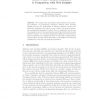Free Online Productivity Tools
i2Speak
i2Symbol
i2OCR
iTex2Img
iWeb2Print
iWeb2Shot
i2Type
iPdf2Split
iPdf2Merge
i2Bopomofo
i2Arabic
i2Style
i2Image
i2PDF
iLatex2Rtf
Sci2ools
112
click to vote
ASM
2003
ASM
2003
ASM
ASMs versus Natural Semantics: A Comparison with New Insights
Abstract. We compare three specification frameworks for the operationtics of programming languages, abstract state machines (ASMs) and the two incarnations of natural semantics, big-step and small-step semantics, with respect to two criteria: the range of imperative programming languages to which they are applicable and the way the program is used in the specifications and treated during the thereby defined execution. To reveal the fundamental differences between these three mechanisms, we investigate if there are automatic transformations between them. As a side effect, this leads to new insights concerning the classification of big-step and small-step semantics.
| Added | 06 Jul 2010 |
| Updated | 06 Jul 2010 |
| Type | Conference |
| Year | 2003 |
| Where | ASM |
| Authors | Sabine Glesner |
Comments (0)

